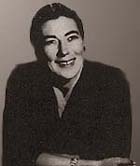September 2, 2008
Happy Birthday, Evelyn Hooker
Today is the 101st anniversary of Dr. Evelyn Hooker’s birth.
Dr. Hooker, the psychologist who is widely credited with helping to establish that homosexuality is not inherently linked to mental illness, was born September 2, 1907, in North Platte, Nebraska. She was the sixth of nine children.
 In the course of her remarkable life, Dr. Hooker surmounted many of the barriers faced by women who sought an academic career in the 20th century. She is best known for her psychological research in the 1950s and 1960s with gay men.
In the course of her remarkable life, Dr. Hooker surmounted many of the barriers faced by women who sought an academic career in the 20th century. She is best known for her psychological research in the 1950s and 1960s with gay men.
Her studies were innovative in several important respects. Rather than simply accepting the conventional wisdom that homosexuality is a pathology, she used the scientific method to test this assumption. And rather than studying homosexual psychiatric patients, she recruited a sample of gay men who were functioning normally in society.
For her best known study, published in 1957 in The Journal of Projective Techniques, she recruited 30 homosexual males and 30 heterosexual males through community organizations in the Los Angeles area. The two groups were matched for age, IQ, and education. None of the men were in therapy at the time of the study.
She administered three projective tests to the men — the Rorschach inkblot test, the Thematic Apperception Test (TAT), and the Make-A-Picture-Story (MAPS) Test). Then she asked outside experts with no prior knowledge of the men’s sexual orientation to use the test data to rate their mental health. Although today it seems like an obvious safeguard against bias, Dr. Hooker’s was the first published study to utilize raters who were “blind” to the sexual orientation of the study participants.
Using the Rorschach data, two of the independent experts evaluated the men’s overall adjustment using a 5-point scale. They classified two-thirds of the heterosexuals and two-thirds of the homosexuals in the three highest categories of adjustment. When asked to identify which Rorschach protocols were obtained from homosexuals, the experts couldn’t do it at a level better than chance.
A third expert used the TAT and MAPS protocols to evaluate the men’s psychological adjustment. As with the Rorschach responses, the adjustment ratings of the homosexuals and heterosexuals did not differ significantly.
Dr. Hooker concluded from her data that homosexuality is not a clinical entity and that homosexuality is not inherently associated with psychopathology. Her findings have since been replicated by other investigators using a variety of research methods.
In retrospect, we can see that Dr. Hooker’s main hypothesis — that no group differences in psychological distress should exist between heterosexual and homosexual samples — actually applied too strict a test. We know today that some members of stigmatized groups manifest elevated rates of psychological distress because of the stress imposed on them by social ostracism, harassment, discrimination, and violence. Such patterns don’t indicate that the group is inherently disturbed.
Nevertheless, by demonstrating that well-adjusted homosexuals not only existed but in fact were numerous, Dr. Hooker’s research demonstrated that the illness model had no scientific basis. She helped to lay the foundation for the American Psychiatric Association’s 1973 decision to remove homosexuality from its Diagnostic & Statistical Manual of Mental Disorders, and for the American Psychological Association’s subsequent commitment to removing the stigma that has historically been attached to homosexuality.
Dr. Hooker died at her Santa Monica home on November 18, 1996. Her pioneering research and remarkable life were honored with awards from numerous professional organizations, including the American Psychological Association, and many advocacy and community groups.
*Â Â Â Â Â Â Â Â Â *Â Â Â Â Â Â Â Â Â *Â Â Â Â Â Â Â Â Â *Â Â Â Â Â Â Â Â Â *
For more information, see the 1992 Oscar-nominated documentary, Changing Our Minds The Story of Dr. Evelyn Hooker.
A biographical sketch and a selected bibliography of Dr. Hooker’s publications can be found at my UC Davis website.
